|
|
|
Sort Order |
|
|
|
Items / Page
|
|
|
|
|
|
|
| Srl | Item |
| 1 |
ID:
127065


|
|
|
|
|
| Publication |
2013.
|
| Summary/Abstract |
This article examines the role of the European Union (EU) and United States as actors in international disaster relief. We take the analysis of 'actorness' one step further than normal by assessing the extent to which different aspects of EU and US actorness led to effectiveness in actual outcomes. In doing so, we make two contributions. First, we provide a rare comparison between EU and US foreign policy actorness, shedding light on the actor capability of each bloc in the area of international disaster relief. Second, we specify the relationship between actorness and effectiveness, a relationship which is too often assumed rather than explored. Using previous research of EU and US actorness as a starting point, we link four aspects of actorness to effectiveness and assess the resulting hypotheses using the case of the 2010 Haiti earthquake. We find support for our proposed links between actorness and effectiveness, although further research is needed before robust conclusions can be drawn.
|
|
|
|
|
|
|
|
|
|
|
|
|
|
|
|
| 2 |
ID:
128871


|
|
|
|
|
| Publication |
2014.
|
| Summary/Abstract |
This article presents an eclectic review of the analytical study of terrorism that views all agents as rational decisionmakers. This analytical literature began in earnest with the seminal study of US skyjackings by William Landes in 1978. After 11 September 2001, the analytical literature on terrorism grew rapidly. Based on policy relevance, my survey article identifies five key areas of intense research interests. These include analyses of terrorist attack trends, the economic consequences of terrorism, the study of counterterrorism effectiveness, the causes of terrorism, and the relationship of terrorism and liberal democracies. New developments in the field focused on distinguishing key differences between domestic and transnational terrorism. Additionally, recent game-theoretic advances permitted more active agents and stages to the games. Other major developments involved the study of networked terrorists and the role of counterterrorism foreign aid. Fruitful future directions include using advanced econometric methods to discern the true impact of terrorism on growth, applying spatial econometrics to the study of terrorism, ascertaining the determinants of terrorist groups' longevity, and learning how to foster international counterterrorism cooperation.
|
|
|
|
|
|
|
|
|
|
|
|
|
|
|
|
| 3 |
ID:
168307
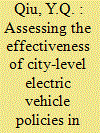

|
|
|
|
|
| Summary/Abstract |
Diffusion of electric vehicles (EVs) is regarded as an important strategy for promoting renewable energy development and controlling CO2 emissions in China. Thus, several incentive measures and policies have been released by the pilot cities in China. The question arises as to whether these policies are effective in promoting the EV deployment. This paper assesses the effectiveness of various EV incentive policies at city level by using the data from 88 Chinese pilot cities. Our regression results show a positive relationship between EV sales volume and two demand-side policies: charging discount and infrastructure construction subsidy. However, purchase subsidy policy is found to have no significant effect. Parking benefits policy shows no effect on promoting EV sales. On the other hand, two supply side policies — model development award and manufacturing award — are not effective. We suggest that local governments may keep those two effective policies, phase out the purchase subsidy policy, terminate the parking benefits policy and suspend the model development award policy. The manufacturing award policy can either be paused or be bundled with other regulations or policies that make specific requirements for EV quality.
|
|
|
|
|
|
|
|
|
|
|
|
|
|
|
|
| 4 |
ID:
169152
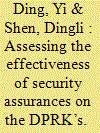

|
|
|
|
|
| Summary/Abstract |
In the Democratic People’s Republic of Korea (DPRK)’s case of nuclear
proliferation, less attention has been paid to the role of security assurances. This
paper seeks to assess the role of security assurances for the DPRK provided by the
UN, the Soviet Union, China, and the United States and to figure out why these
assurances are less effective to bridle its nuclear ambition. It argues that an effective
security assurance for nuclear non-proliferation should meet at least two conditions.
Firstly the security assurance should be credible, which can be realized by being
publicized, legally binding, and infusing with further commitments. Secondly, the
security assurance tailored to the unique features of the target state’s concerns is
more likely to be effective. Using this set of criteria, the only moderately effective
assurance is that provided by the Soviet Union. The general security assurance
of the UN is neither legally binding nor specifically targeted. The alliance with
China exists only on paper as Pyongyang believes Beijing is reluctant to fulfill its
obligation as an ally. The United States is taking a capricious attitude on the DPRK
and none of its security assurances are legalized or address its major concern of
regime survival. These may help explain why security assurances failed to prevent
the DPRK from acquiring nuclear weapons.
|
|
|
|
|
|
|
|
|
|
|
|
|
|
|
|
| 5 |
ID:
120307
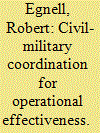

|
|
|
|
|
| Publication |
2013.
|
| Summary/Abstract |
The last decade has witnessed a cascading proliferation of strategic concepts that emphasise the importance of civil-military cooperation, coordination, or integration for effectiveness in complex operations. These efforts nevertheless often lack an appreciation for why, where, and how such integration and coordination should take place to achieve the desired outcomes. This article introduces a new approach to civil-military coordination that incorporates the challenges and possibilities at both the national/strategic level and the tactical level in field of operations. By integrating and coordinating these efforts at the strategic level, this approach allows policymakers to achieve separation of actors and responsibilities in the field of operations. By doing so, the proposed approach seeks to answer more specific questions about when coordination is necessary for effectiveness, what its aims are, what actors need to be involved, and to what extent and at what level of command the actors need to be coordinated.
|
|
|
|
|
|
|
|
|
|
|
|
|
|
|
|
| 6 |
ID:
140728
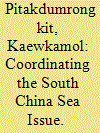

|
|
|
|
|
| Summary/Abstract |
This article studies the roles of Association of Southeast Asian Nations country coordinators in shaping negotiation outcomes, which have been under-examined. A question: ‘What makes an effective coordinator?’ is explored. ‘Effectiveness’ is the ability to shape outcomes in one's direction. This paper argues that a coordinator's effectiveness is rooted in resource management, not resource possession. To be effective, the coordinator must turn the resources at hand into bargaining leverage vis-à-vis the others. To validate the argument, this paper demonstrates how Thailand, taking advantage of its coordinator position, advanced the talks on the Code of Conduct of the South China Sea resulting in the first formal consultation in September 2013.
|
|
|
|
|
|
|
|
|
|
|
|
|
|
|
|
| 7 |
ID:
183852
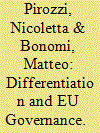

|
|
|
|
|
| Summary/Abstract |
Existing literature on differentiated integration has made an important contribution in theorising and operationalising its regulatory dimension. However, in order to fully evaluate the impact of differentiation on EU governance, this approach needs to be enriched with additional elements. The organisational element allows us to grasp the different forms, venues and actors of differentiation. The constitutional element connects the different forms of differentiation to the foundations of EU constitutionalism and identity. The socio-political element goes beyond the analysis of differentiation as a policy practice and qualifies it as a policy choice. On this basis, a generalisation is proposed resulting from a comparative analysis of a wide range of contributions in different policy sectors in order to assess differentiation in the EU’s governance against three main criteria: effectiveness, sustainability and accountability/legitimacy.
|
|
|
|
|
|
|
|
|
|
|
|
|
|
|
|
| 8 |
ID:
152796


|
|
|
|
|
| Summary/Abstract |
In international development, shared ownership is assumed to be a condition for effectiveness. Academic studies question this relation, claiming shared ownership can instead lead to ineffectiveness. This study analysed the interplay between ownership and effectiveness in a transnational advocacy network for conflict prevention observed 2012–2015. Building on recent discussions about balancing unity and diversity in networks, this article unpacks the ownership/effectiveness relationship into three dimensions: collective identity, accountability processes and a shared advocacy message. We find that the question is not about more or less effectiveness, but about the processes shaping the meaning of effectiveness in particular institutional constellations.
|
|
|
|
|
|
|
|
|
|
|
|
|
|
|
|
| 9 |
ID:
157983


|
|
|
|
|
| Summary/Abstract |
The European Union Police Mission for the Palestinian Territories (EUPOL COPPS) was established in 2006 to contribute to the establishment of effective policing in support of an independent and democratic Palestinian state. EUPOL COPPS is often commended for its contribution to the professionalization of the Palestinian security sector under local ownership. Drawing on 40 interviews, we argue that the mission can be considered effective and locally owned only from a narrow technocratic perspective, which denies the political reality of continued occupation and absence of democracy. A broader analysis, which includes the voices of ordinary Palestinians, reveals that EUPOL COPPS contributed to the professionalization of authoritarian policing under continued Israeli occupation. Our findings show the limits of technocratic approaches to peacebuilding interventions and call for a stronger engagement with the ultimate beneficiaries of peacebuilding missions.
|
|
|
|
|
|
|
|
|
|
|
|
|
|
|
|
| 10 |
ID:
096233
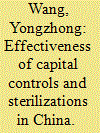

|
|
|
|
|
| Publication |
2010.
|
| Summary/Abstract |
Since 2003, China has been facing a trilemma of determining how to maintain independent monetary policy and limit exchange rate flexibility simultaneously, while facing persistent and substantial international capital flows. The present paper is an empirical evaluation of the effectiveness of China's sterilizations and capital mobility regulations, measured by sterilization and offset coefficients, respectively, using monthly data between mid-1999 and March 2009. We find that the effectiveness of China's sterilizations is almost perfect in terms of the monetary base, but not in terms of M2, and that China's capital controls still work but are not quite effective. Recursive estimation reveals that increasing mobility of capital flows and decreasing effectiveness of sterilizations might undercut China's ability to maintain monetary autonomy and domestic currency stability simultaneously. To solve the trilemma smoothly, China's monetary authority should continue to relax the management of the exchange rate, and take further steps towards deregulation of capital outflows.
|
|
|
|
|
|
|
|
|
|
|
|
|
|
|
|
| 11 |
ID:
136247


|
|
|
|
|
| Summary/Abstract |
A reduction of energy service demand is a climate mitigation option, but its effectiveness has never been quantified. We quantify the effectiveness of energy service demand reduction in the building, transport, and industry sectors using the Asia-Pacific Integrated Assessment/Computable General Equilibrium (AIM/CGE) model for the period 2015–2050 under various scenarios. There were two major findings. First, a 25% energy service demand reduction in the building, transport, and basic material industry sectors would reduce the GDP loss induced by climate mitigation from 4.0% to 3.0% and from 1.2% to 0.7% in 2050 under the 450 ppm and 550 ppm CO2 equivalent concentration stabilization scenarios, respectively. Second, the effectiveness of a reduction in the building sector׳s energy service demand would be higher than those of the other sectors at the same rate of the energy service demand reduction. Furthermore, we also conducted a sensitivity analysis of different socioeconomic conditions, and the climate mitigation target was found to be a key determinant of the effectiveness of energy service demand reduction measures. Therefore, more certain climate mitigation targets would be useful for the decision makers who design energy service demand reduction measures.
|
|
|
|
|
|
|
|
|
|
|
|
|
|
|
|
| 12 |
ID:
172747
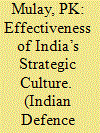

|
|
|
| 13 |
ID:
172748
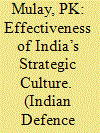

|
|
|
| 14 |
ID:
154481


|
|
|
|
|
| Summary/Abstract |
The Democratic Republic of Congo (DRC) is a country with high natural resources, but it has suffered from decades of civil wars and social turmoil, being heavily aid-dependent. In the DRC, several Nonprofit Organisations (NPOs) are major players in fighting poverty and enhancing welfare. This research aims to analyse the effectiveness of small NPOs in improving poor peoples’ lives through health, education, and economic activities. Two NPOs working in the DRC, one in a rural and the other in an urban area, are compared by researching the aid sites and surveying 201 households (aid beneficiaries). Our case observations and the survey results facilitate analysing the mission accomplishment, effectiveness, and accountability of the NPOs although we admit that the DRC conditions make exact measurements difficult. Multivariate analyses are used to study the differences in aid impacts. There are significant differences in the beneficiaries’ perception of the NPO effectiveness in improving health while no significant differences in education impact were found. This is probably because both case NPOs have succeeded in getting a large proportion of the children of their area registered in the education centres created by the NPOs. Differences were observed in the accountability and reporting style of the NPOs.
|
|
|
|
|
|
|
|
|
|
|
|
|
|
|
|
| 15 |
ID:
098775
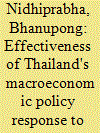

|
|
|
| 16 |
ID:
127060
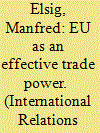

|
|
|
|
|
| Publication |
2013.
|
| Summary/Abstract |
Drawing on the European Union (EU) foreign policy literature on effectiveness, this article studies how the European Union chooses judges to serve on the World Trade Organization's key judicial institution: the Appellate Body. Conceptually, the article differentiates between effectiveness in representation and effectiveness in impact. The article shows how delegation to the European Commission has increased the strategic agenda-setting power for championing its preferred candidates. The article further compares European and US practice in nominating candidates. Overall, the article finds that effectiveness in representation has increased over time. In terms of effectiveness in impact, the article shows how the international environment conditions the EU's influence. The article also exposes the difficulties of studying the effectiveness of EU external relations due to the peculiar decision-making processes dominant in judicial bodies.
|
|
|
|
|
|
|
|
|
|
|
|
|
|
|
|
| 17 |
ID:
127017
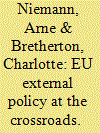

|
|
|
|
|
| Publication |
2013.
|
| Summary/Abstract |
The goal of this Special Issue is to improve our conceptualisation and empirical understanding of EU actorness and effectiveness in International Relations. While the European Union aspires to play a greater global role, its actorness and effectiveness cannot be taken for granted given the nature of the EU as a multi-level and semi-supranational polity encompassing 28 Member States with diverse foreign policy preferences. The EU is presently at an important crossroad. On the one hand, its external policy stature and capacity have been boosted by institutional innovations and by the Union's increased involvement in the full spectrum of international issues. On the other hand, a number of factors cast doubt on the EU's real external policy actorness and effectiveness: slow and often only modest internal reforms, an increasing politicisation of formally 'low politics' issues, the prolonged sovereign debt crisis in the Eurozone, and a less favourable external environment, with the US shifting its focus to the Asia-Pacific region and emerging powers creating a more polycentric world order. In view of these changes and subsequent developments in the scholarly literature, our aim is to re-evaluate earlier conceptions of EU actorness. Central to this re-evaluation will be a shift in focus from notions of actorness to effectiveness. This introductory article will unpack and further elaborate the issues raised in this abstract by delineating the EU as an international actor in the empirical context, by reviewing the existing conceptual literature, defining and conceptualizing key notions and by providing an overview of the contributions to this Special Issue.
|
|
|
|
|
|
|
|
|
|
|
|
|
|
|
|
| 18 |
ID:
187347
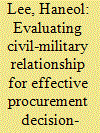

|
|
|
|
|
| Summary/Abstract |
Overseas procurement aims not only to acquire the most high-end weapons systems, but also to enhance their technological expertise. However, the degree to which a procuring state succeeds in these dual objectives varies. Sometimes, a state acquires nearly the most advanced weapon systems in a timely manner with significant terms of technology transfer. At other times, a state’s procurement is fraught with a series of disadvantageous decisions on technology transfer, maintenance, and timeliness. From where does this variation in effectiveness emanate? This article argues that the key to explaining these variations is civil–military co-ordination. States can secure effectiveness when a civilian chief executive proactively capitalises on appointment authority and/or when proactive civil–military consultations transpire. For these causations, this article studies two major fighter jet procurement activities of the Republic of Korea (ROK), the Korea Fighter Project (KFP) and the Fighter eXperimental-I (FX-I) programme.
|
|
|
|
|
|
|
|
|
|
|
|
|
|
|
|
| 19 |
ID:
163503


|
|
|
|
|
| Summary/Abstract |
China's Rural Minimum Living Standard Guarantee program (Dibao) is the largest social safety-net program in the world. Given the scale and the popularity of Rural Dibao, it is necessary to rigorously evaluate it so that policymakers know the extent to which the program meets its intended objective of reducing poverty. This paper develops some new methods and uses data from the 2013 Chinese Household Income Project (CHIP2013) to examine the targeting performance of the rural Dibao program. The paper has found that the Rural Dibao program suffers from very low targeting accuracy, high exclusion error, and inclusion error, and yields a significant negative social rate of return. It discusses possible causes and argues that the fundamental mechanism has to be redesigned to increase the effectiveness of the program. The paper makes some recommendations to reform Dibao that will significantly improve targeting and reduce the cost of running the program. That will help China to achieve its goal of eradicating extreme poverty by 2020.
|
|
|
|
|
|
|
|
|
|
|
|
|
|
|
|
| 20 |
ID:
167176


|
|
|
|
|
| Summary/Abstract |
The possibility for Croatia to obtain new fighter aircraft is not new, as this option has been publicly debated for at least a decade. A sudden decision to advance the acquisition of a limited number of fighter aircraft was made in 2017 with an international tendering process concluding in early 2018. Through open source material, this paper will look at this procurement process by examining the relationship between policy and strategic thinking on the one side, and policy delivery on the other, and evaluate why the tendering process failed in achieving envisaged results. The paper concludes that the problems facing the Croatian aircraft acquisition process stem from at least two interrelated factors: firstly, at the operational level, the failure of the procurement was the direct result of mismanaged tendering procedures linked to the wider public administration reform process; and secondly, at the strategic level, inherently complex civil-military relations and related cultural aspects which have not been adequately addressed over the past decades. The result was a failure to deliver on government policy, something which this paper argues will need to be addressed over the medium to long term.
|
|
|
|
|
|
|
|
|
|
|
|
|
|
|
|
|
|
|
|
|